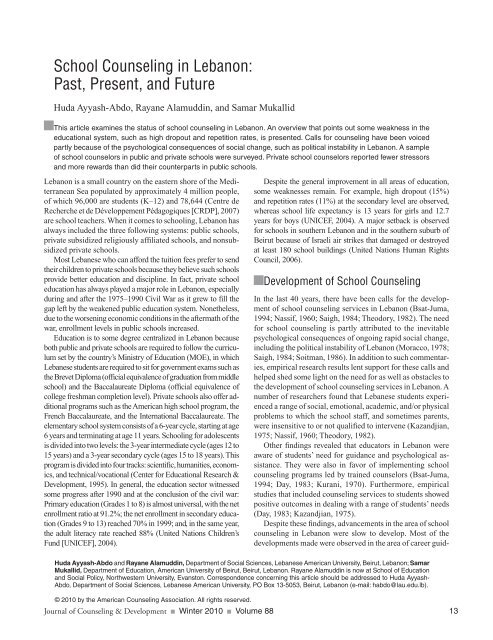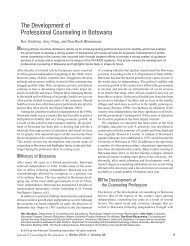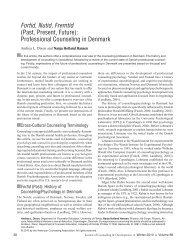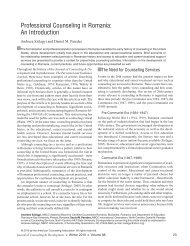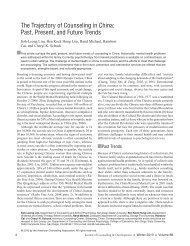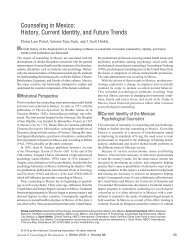School Counseling in Lebanon: Past, Present, and Future - IRCEP
School Counseling in Lebanon: Past, Present, and Future - IRCEP
School Counseling in Lebanon: Past, Present, and Future - IRCEP
You also want an ePaper? Increase the reach of your titles
YUMPU automatically turns print PDFs into web optimized ePapers that Google loves.
<strong>School</strong> <strong>Counsel<strong>in</strong>g</strong> <strong>in</strong> <strong>Lebanon</strong>:<br />
<strong>Past</strong>, <strong>Present</strong>, <strong>and</strong> <strong>Future</strong><br />
Huda Ayyash-Abdo, Rayane Alamudd<strong>in</strong>, <strong>and</strong> Samar Mukallid<br />
This article exam<strong>in</strong>es the status of school counsel<strong>in</strong>g <strong>in</strong> <strong>Lebanon</strong>. An overview that po<strong>in</strong>ts out some weakness <strong>in</strong> the<br />
educational system, such as high dropout <strong>and</strong> repetition rates, is presented. Calls for counsel<strong>in</strong>g have been voiced<br />
partly because of the psychological consequences of social change, such as political <strong>in</strong>stability <strong>in</strong> <strong>Lebanon</strong>. A sample<br />
of school counselors <strong>in</strong> public <strong>and</strong> private schools were surveyed. Private school counselors reported fewer stressors<br />
<strong>and</strong> more rewards than did their counterparts <strong>in</strong> public schools.<br />
<strong>Lebanon</strong> is a small country on the eastern shore of the Mediterranean<br />
Sea populated by approximately 4 million people,<br />
of which 96,000 are students (K–12) <strong>and</strong> 78,644 (Centre de<br />
Recherche et de Développement Pédagogiques [CRDP], 2007)<br />
are school teachers. When it comes to school<strong>in</strong>g, <strong>Lebanon</strong> has<br />
always <strong>in</strong>cluded the three follow<strong>in</strong>g systems: public schools,<br />
private subsidized religiously affiliated schools, <strong>and</strong> nonsubsidized<br />
private schools.<br />
Most Lebanese who can afford the tuition fees prefer to send<br />
their children to private schools because they believe such schools<br />
provide better education <strong>and</strong> discipl<strong>in</strong>e. In fact, private school<br />
education has always played a major role <strong>in</strong> <strong>Lebanon</strong>, especially<br />
dur<strong>in</strong>g <strong>and</strong> after the 1975–1990 Civil War as it grew to fill the<br />
gap left by the weakened public education system. Nonetheless,<br />
due to the worsen<strong>in</strong>g economic conditions <strong>in</strong> the aftermath of the<br />
war, enrollment levels <strong>in</strong> public schools <strong>in</strong>creased.<br />
Education is to some degree centralized <strong>in</strong> <strong>Lebanon</strong> because<br />
both public <strong>and</strong> private schools are required to follow the curriculum<br />
set by the country’s M<strong>in</strong>istry of Education (MOE), <strong>in</strong> which<br />
Lebanese students are required to sit for government exams such as<br />
the Brevet Diploma (official equivalence of graduation from middle<br />
school) <strong>and</strong> the Baccalaureate Diploma (official equivalence of<br />
college freshman completion level). Private schools also offer additional<br />
programs such as the American high school program, the<br />
French Baccalaureate, <strong>and</strong> the International Baccalaureate. The<br />
elementary school system consists of a 6-year cycle, start<strong>in</strong>g at age<br />
6 years <strong>and</strong> term<strong>in</strong>at<strong>in</strong>g at age 11 years. <strong>School</strong><strong>in</strong>g for adolescents<br />
is divided <strong>in</strong>to two levels: the 3-year <strong>in</strong>termediate cycle (ages 12 to<br />
15 years) <strong>and</strong> a 3-year secondary cycle (ages 15 to 18 years). This<br />
program is divided <strong>in</strong>to four tracks: scientific, humanities, economics,<br />
<strong>and</strong> technical/vocational (Center for Educational Research &<br />
Development, 1995). In general, the education sector witnessed<br />
some progress after 1990 <strong>and</strong> at the conclusion of the civil war:<br />
Primary education (Grades 1 to 8) is almost universal, with the net<br />
enrollment ratio at 91.2%; the net enrollment <strong>in</strong> secondary education<br />
(Grades 9 to 13) reached 70% <strong>in</strong> 1999; <strong>and</strong>, <strong>in</strong> the same year,<br />
the adult literacy rate reached 88% (United Nations Children’s<br />
Fund [UNICEF], 2004).<br />
Despite the general improvement <strong>in</strong> all areas of education,<br />
some weaknesses rema<strong>in</strong>. For example, high dropout (15%)<br />
<strong>and</strong> repetition rates (11%) at the secondary level are observed,<br />
whereas school life expectancy is 13 years for girls <strong>and</strong> 12.7<br />
years for boys (UNICEF, 2004). A major setback is observed<br />
for schools <strong>in</strong> southern <strong>Lebanon</strong> <strong>and</strong> <strong>in</strong> the southern suburb of<br />
Beirut because of Israeli air strikes that damaged or destroyed<br />
at least 180 school build<strong>in</strong>gs (United Nations Human Rights<br />
Council, 2006).<br />
Development of <strong>School</strong> <strong>Counsel<strong>in</strong>g</strong><br />
In the last 40 years, there have been calls for the development<br />
of school counsel<strong>in</strong>g services <strong>in</strong> <strong>Lebanon</strong> (Bsat-Juma,<br />
1994; Nassif, 1960; Saigh, 1984; Theodory, 1982). The need<br />
for school counsel<strong>in</strong>g is partly attributed to the <strong>in</strong>evitable<br />
psychological consequences of ongo<strong>in</strong>g rapid social change,<br />
<strong>in</strong>clud<strong>in</strong>g the political <strong>in</strong>stability of <strong>Lebanon</strong> (Moracco, 1978;<br />
Saigh, 1984; Soitman, 1986). In addition to such commentaries,<br />
empirical research results lent support for these calls <strong>and</strong><br />
helped shed some light on the need for as well as obstacles to<br />
the development of school counsel<strong>in</strong>g services <strong>in</strong> <strong>Lebanon</strong>. A<br />
number of researchers found that Lebanese students experienced<br />
a range of social, emotional, academic, <strong>and</strong>/or physical<br />
problems to which the school staff, <strong>and</strong> sometimes parents,<br />
were <strong>in</strong>sensitive to or not qualified to <strong>in</strong>tervene (Kaz<strong>and</strong>jian,<br />
1975; Nassif, 1960; Theodory, 1982).<br />
Other f<strong>in</strong>d<strong>in</strong>gs revealed that educators <strong>in</strong> <strong>Lebanon</strong> were<br />
aware of students’ need for guidance <strong>and</strong> psychological assistance.<br />
They were also <strong>in</strong> favor of implement<strong>in</strong>g school<br />
counsel<strong>in</strong>g programs led by tra<strong>in</strong>ed counselors (Bsat-Juma,<br />
1994; Day, 1983; Kurani, 1970). Furthermore, empirical<br />
studies that <strong>in</strong>cluded counsel<strong>in</strong>g services to students showed<br />
positive outcomes <strong>in</strong> deal<strong>in</strong>g with a range of students’ needs<br />
(Day, 1983; Kaz<strong>and</strong>jian, 1975).<br />
Despite these f<strong>in</strong>d<strong>in</strong>gs, advancements <strong>in</strong> the area of school<br />
counsel<strong>in</strong>g <strong>in</strong> <strong>Lebanon</strong> were slow to develop. Most of the<br />
developments made were observed <strong>in</strong> the area of career guid-<br />
Huda Ayyash-Abdo <strong>and</strong> Rayane Alamudd<strong>in</strong>, Department of Social Sciences, Lebanese American University, Beirut, <strong>Lebanon</strong>; Samar<br />
Mukallid, Department of Education, American University of Beirut, Beirut, <strong>Lebanon</strong>. Rayane Alamudd<strong>in</strong> is now at <strong>School</strong> of Education<br />
<strong>and</strong> Social Policy, Northwestern University, Evanston. Correspondence concern<strong>in</strong>g this article should be addressed to Huda Ayyash-<br />
Abdo, Department of Social Sciences, Lebanese American University, PO Box 13-5053, Beirut, <strong>Lebanon</strong> (e-mail: habdo@lau.edu.lb).<br />
© 2010 by the American <strong>Counsel<strong>in</strong>g</strong> Association. All rights reserved.<br />
Journal of <strong>Counsel<strong>in</strong>g</strong> & Development ■ W<strong>in</strong>ter 2010 ■ Volume 88 13
Ayyash-Abdo, Alamudd<strong>in</strong>, & Mukallid<br />
ance. The most susta<strong>in</strong>ed effort was the establishment of the<br />
Career Guidance Center at the American University of Beirut<br />
<strong>in</strong> 1985, which emerged <strong>in</strong> part because of the lack of career<br />
guidance <strong>and</strong> counsel<strong>in</strong>g services <strong>in</strong> <strong>Lebanon</strong>’s schools. The<br />
Hariri Foundation orig<strong>in</strong>ally established the Career Guidance<br />
Center as a means of assist<strong>in</strong>g its funded Lebanese youth <strong>in</strong><br />
select<strong>in</strong>g a major to pursue their higher education abroad. By<br />
the year 1993, the center grew to provide broader counsel<strong>in</strong>g<br />
services to college students <strong>in</strong> general <strong>and</strong> <strong>in</strong>fused career<br />
education <strong>in</strong> the curriculum of several schools <strong>in</strong> the country<br />
(Hajj & Hamadeh, 1993). (In 1996, the Career Guidance<br />
Center moved back to the Hariri Foundation <strong>and</strong> became a<br />
part of its adm<strong>in</strong>istrative channel under the title of Career<br />
Guidance Department [www.hariri-foundation.org.lb].) The<br />
Career Guidance Department at the Hariri Foundation has<br />
been hold<strong>in</strong>g a large-scale national annual career fair for the<br />
last 12 years. Yet, the aforementioned efforts have not yielded<br />
far-reach<strong>in</strong>g consequences for Lebanese students <strong>in</strong> the area<br />
of career guidance <strong>and</strong> counsel<strong>in</strong>g as discussed later <strong>in</strong> this<br />
article. (A number of the ideas presented <strong>in</strong> the next section<br />
are based on the personal experience of the third author as<br />
a tra<strong>in</strong>er of public school teachers, over a period of 4 years,<br />
<strong>and</strong> <strong>in</strong> her capacity as a UNICEF consultant on a school<br />
counsel<strong>in</strong>g project.)<br />
<strong>Present</strong> State of <strong>School</strong> <strong>Counsel<strong>in</strong>g</strong><br />
Until June 2006, an estimated 35% of all preschool, primary,<br />
<strong>in</strong>termediate, <strong>and</strong> secondary students <strong>in</strong> <strong>Lebanon</strong> were enrolled<br />
<strong>in</strong> public schools (CRDP, 2007). This number is expected to<br />
<strong>in</strong>crease further because of the devastat<strong>in</strong>g impact of the recent<br />
July 2006 Israeli war on <strong>Lebanon</strong>’s national economy. The<br />
majority of the rema<strong>in</strong><strong>in</strong>g students were enrolled <strong>in</strong> private<br />
schools (53%) or <strong>in</strong> subsidized private schools (12%; CRDP,<br />
2007). When it comes to school counsel<strong>in</strong>g, a large discrepancy<br />
exists between the public <strong>and</strong> private school sectors <strong>in</strong><br />
counselor preparation, qualifications, workload, <strong>and</strong> conditions.<br />
This discrepancy has important implications to envision<strong>in</strong>g a<br />
unified policy <strong>and</strong> professional st<strong>and</strong>ards for the practice of<br />
school counsel<strong>in</strong>g <strong>in</strong> the Lebanese context; therefore, we discuss<br />
school counsel<strong>in</strong>g <strong>in</strong> the two sectors separately.<br />
<strong>School</strong> <strong>Counsel<strong>in</strong>g</strong> <strong>in</strong> Public <strong>School</strong>s<br />
Currently, there are school counselors present <strong>in</strong> approximately<br />
100 public elementary <strong>and</strong> middle schools out of 619<br />
public schools throughout <strong>Lebanon</strong> (CRDP, 2007); these<br />
counselors are assisted by a total of 20 school counsel<strong>in</strong>g<br />
coord<strong>in</strong>ators. This came about through the efforts of the<br />
MOE’s Office of Guidance <strong>and</strong> <strong>Counsel<strong>in</strong>g</strong>, <strong>in</strong> cooperation<br />
with UNICEF’s Beirut office, which took the first step to<br />
tra<strong>in</strong> school counselors <strong>in</strong> 1996. In 2002, 120 elementary<br />
<strong>and</strong> middle school teachers with a m<strong>in</strong>imum of 5 years teach<strong>in</strong>g<br />
experience <strong>and</strong> hold<strong>in</strong>g at least a bachelor’s degree <strong>in</strong><br />
psychology, sociology, or philosophy were tra<strong>in</strong>ed. Tra<strong>in</strong><strong>in</strong>g<br />
<strong>in</strong>cluded theoretical <strong>and</strong> practical components that targeted<br />
a preventive developmental approach to school counsel<strong>in</strong>g<br />
<strong>and</strong> a follow-up phase dur<strong>in</strong>g which the tra<strong>in</strong>ees applied supervised<br />
school counsel<strong>in</strong>g activities (for more details on the<br />
tra<strong>in</strong><strong>in</strong>g program, see Mukallid, 2005). In 2003, the tra<strong>in</strong>ed<br />
counselors were then appo<strong>in</strong>ted as teachers/counselors, with<br />
25% of their workload assigned to teach<strong>in</strong>g <strong>and</strong> 75% of their<br />
workload assigned to counsel<strong>in</strong>g.<br />
It is important to note that these tra<strong>in</strong>ed teachers/counselors<br />
<strong>and</strong> coord<strong>in</strong>ators cont<strong>in</strong>ue to ma<strong>in</strong>ta<strong>in</strong> counsel<strong>in</strong>g services <strong>in</strong><br />
their schools <strong>in</strong> the absence of policies, professional role statements,<br />
st<strong>and</strong>ards for the practice of school counsel<strong>in</strong>g at the<br />
MOE, <strong>and</strong> compensation for their additional counsel<strong>in</strong>g <strong>and</strong><br />
coord<strong>in</strong>ation responsibilities. Further pressure has been added<br />
to their workload <strong>in</strong> public schools because they have been<br />
work<strong>in</strong>g <strong>in</strong> more than one school due to a shortage of tra<strong>in</strong>ed<br />
counselors. Counselors compla<strong>in</strong> of a shortage of affordable<br />
or government-sponsored supportive psychological services<br />
outside the school context for referral purposes. Such services<br />
are greatly needed, especially because public school students<br />
belong to relatively low-<strong>in</strong>come families that cannot afford the<br />
expensive psychological services <strong>in</strong> <strong>Lebanon</strong>. The practic<strong>in</strong>g<br />
school counselors do not hold academic degrees <strong>in</strong> school counsel<strong>in</strong>g,<br />
but they base their practice on an <strong>in</strong>tensive <strong>in</strong>-service<br />
tra<strong>in</strong><strong>in</strong>g program that focused primarily on the relatively recent<br />
developmental preventive school counsel<strong>in</strong>g approach. Accord<strong>in</strong>gly,<br />
school counselors <strong>in</strong> public schools are <strong>in</strong> need of further<br />
tra<strong>in</strong><strong>in</strong>g <strong>in</strong> <strong>in</strong>dividual counsel<strong>in</strong>g skills <strong>and</strong> crisis <strong>in</strong>tervention as<br />
well as <strong>in</strong> develop<strong>in</strong>g a counsel<strong>in</strong>g curriculum that will serve as<br />
a major component of a comprehensive developmental school<br />
guidance <strong>and</strong> counsel<strong>in</strong>g program (American <strong>School</strong> Counselor<br />
Association [ASCA], 2003).<br />
Public school counselors (n = 42) were surveyed while<br />
undergo<strong>in</strong>g tra<strong>in</strong><strong>in</strong>g about what they considered rewards<br />
<strong>and</strong> stressors <strong>in</strong> their work. The top five common rewards<br />
among 70% (n = 30) of the participants were regarded as (a)<br />
supportive parents, (b) cooperative school adm<strong>in</strong>istration,<br />
(c) students’ positive feedback, (d) meet<strong>in</strong>g a dire need for<br />
counsel<strong>in</strong>g among students, <strong>and</strong> (e) mak<strong>in</strong>g a difference <strong>in</strong><br />
students’ lives. In contrast, the share of common stressors was<br />
more than double among 65% (n = 28) of the participants than<br />
that of the rewards. Among the salient stressors were (a) lack<br />
of cooperation from school adm<strong>in</strong>istration <strong>and</strong> from parents;<br />
(b) unavailability of private rooms for counsel<strong>in</strong>g; (c) view<strong>in</strong>g<br />
counsel<strong>in</strong>g as additional workload; (d) the stigma of see<strong>in</strong>g<br />
a counselor among peers <strong>and</strong> other teachers; (e) regard<strong>in</strong>g<br />
counselors as discipl<strong>in</strong>arians; (f) reluctance of students to<br />
disclose to a stranger, a cultural attitude to some degree; (g)<br />
counselors’ need of further tra<strong>in</strong><strong>in</strong>g; <strong>and</strong> (h) not believ<strong>in</strong>g that<br />
counsel<strong>in</strong>g is worthwhile.<br />
<strong>School</strong> <strong>Counsel<strong>in</strong>g</strong> <strong>in</strong> Private <strong>School</strong>s<br />
To ga<strong>in</strong> more <strong>in</strong>formation on the practice of school counsel<strong>in</strong>g<br />
<strong>in</strong> Lebanese private schools, we developed <strong>and</strong> distributed a<br />
14<br />
Journal of <strong>Counsel<strong>in</strong>g</strong> & Development ■ W<strong>in</strong>ter 2010 ■ Volume 88
<strong>School</strong> <strong>Counsel<strong>in</strong>g</strong> <strong>in</strong> <strong>Lebanon</strong><br />
short survey to 11 counselors practic<strong>in</strong>g <strong>in</strong> private schools.<br />
The survey <strong>in</strong>cluded questions about the counselor’s duties,<br />
the academic level of the students served, the stresses <strong>and</strong><br />
rewards of be<strong>in</strong>g a school counselor, <strong>and</strong> a free response question<br />
regard<strong>in</strong>g potential problems the respondent would like<br />
to address <strong>in</strong> his or her role as a school counselor.<br />
The majority (9 out of 11) of the surveyed counselors<br />
<strong>in</strong>dicated they worked with students from all levels (k<strong>in</strong>dergarten<br />
to secondary school), <strong>and</strong> the 2 rema<strong>in</strong><strong>in</strong>g counselors<br />
worked with secondary students. This st<strong>and</strong>s <strong>in</strong> contrast<br />
with counsel<strong>in</strong>g services <strong>in</strong> the public school sector, which<br />
are restricted to the elementary <strong>and</strong> middle schools. All but<br />
2 respondents reported be<strong>in</strong>g the only counselor <strong>in</strong> their<br />
school, a f<strong>in</strong>d<strong>in</strong>g that has implications for the ratio of students<br />
per counselor because the surveyed counselors work with<br />
more than triple the number of recommended students per<br />
counselor (ASCA, 2003).<br />
Eight out of the 11 respondents reported allocat<strong>in</strong>g most of<br />
their yearly duties to <strong>in</strong>dividual counsel<strong>in</strong>g with students, which<br />
<strong>in</strong>dicates an emphasis on the remedial function of counsel<strong>in</strong>g <strong>in</strong><br />
the surveyed private schools. The preventive <strong>and</strong> developmental<br />
functions of school counsel<strong>in</strong>g, on the other h<strong>and</strong>, were not<br />
represented <strong>in</strong> the responses. Nonetheless, almost all counselors<br />
reported engag<strong>in</strong>g <strong>in</strong> a number of other duties, mostly respond<strong>in</strong>g<br />
to crises <strong>and</strong> consult<strong>in</strong>g with parents. Some notable <strong>in</strong>consistencies<br />
were observed <strong>in</strong> the prevalence of different duties<br />
counselors engage <strong>in</strong> across the schools, which may <strong>in</strong>dicate<br />
ambiguity regard<strong>in</strong>g the actual duties of school counselors <strong>in</strong><br />
the Lebanese context. Bsat-Juma (1994) commented on this<br />
issue, as her survey of school directors, teachers, <strong>and</strong> parents<br />
revealed that they all had very different expectations of a school<br />
counselor’s role <strong>and</strong> function.<br />
It is <strong>in</strong>terest<strong>in</strong>g to note that although 9 respondents work<br />
with secondary students, 3 of them do not provide any career<br />
counsel<strong>in</strong>g services <strong>and</strong> 6 counselors allocate a very small<br />
percentage. These observations are <strong>in</strong> l<strong>in</strong>e with Oue<strong>in</strong>i <strong>and</strong><br />
Abdo’s (1999) f<strong>in</strong>d<strong>in</strong>gs concern<strong>in</strong>g the dearth <strong>and</strong> underdevelopment<br />
of career guidance programs <strong>in</strong> the 14 Lebanese<br />
private schools they surveyed with<strong>in</strong> the greater Beirut area.<br />
They further po<strong>in</strong>ted to the very limited effects of the Career<br />
Guidance Center’s efforts to <strong>in</strong>fuse career education <strong>in</strong> the curriculum<br />
of Lebanese school systems (see earlier section).<br />
When asked about the greatest stressors of be<strong>in</strong>g a counselor,<br />
most respondents listed overloaded schedules (n = 7)<br />
<strong>and</strong>/or issues related to deal<strong>in</strong>g with the students’ parents,<br />
whom they perceive as careless about their children’s education<br />
(n = 4), abusive toward their children (n = 1), over<strong>in</strong>volved<br />
<strong>in</strong> the counselor’s work (n = 1), or too permissive <strong>in</strong> their<br />
parent<strong>in</strong>g style (n = 1). Two counselors reported their need<br />
for more tra<strong>in</strong><strong>in</strong>g as a great source of stress, <strong>and</strong> 1 counselor<br />
commented on the lack of resources <strong>in</strong> the community.<br />
On the other h<strong>and</strong>, when the surveyed counselors were asked<br />
about the most reward<strong>in</strong>g aspects of their job, they almost<br />
unanimously identified “see<strong>in</strong>g kids succeed after some k<strong>in</strong>d of<br />
hardship” (n = 9) <strong>and</strong> “be<strong>in</strong>g able to be part of students’ lives” (n<br />
= 9). Seven counselors additionally identified “gett<strong>in</strong>g students<br />
<strong>in</strong>terested <strong>in</strong> their future” as a reward<strong>in</strong>g aspect. Five counselors<br />
<strong>in</strong>cluded additional rewards, such as “fix<strong>in</strong>g” learn<strong>in</strong>g problems,<br />
help<strong>in</strong>g parents or teachers improve their skills, <strong>and</strong> provid<strong>in</strong>g<br />
room for children to express themselves.<br />
F<strong>in</strong>ally, the respondents were asked to list any problems<br />
they would like to address <strong>in</strong> their role as a school counselor.<br />
The majority of the statements revolved around the follow<strong>in</strong>g<br />
themes: problems with parents, teachers, <strong>and</strong>/or community<br />
members lack<strong>in</strong>g knowledge about counsel<strong>in</strong>g <strong>and</strong> its importance<br />
<strong>and</strong> students’ misconceptions of <strong>and</strong> apprehensions<br />
toward counsel<strong>in</strong>g.<br />
The qualifications <strong>and</strong> tra<strong>in</strong><strong>in</strong>g of the surveyed counselors<br />
<strong>in</strong> the private schools are as follows: Of the 11 counselors<br />
surveyed, 5 held a master’s degree <strong>in</strong> educational psychology,<br />
with emphasis on school guidance <strong>and</strong> counsel<strong>in</strong>g; 1 counselor<br />
had completed a master’s degree <strong>in</strong> educational adm<strong>in</strong>istration;<br />
2 counselors held a master’s degree <strong>in</strong> psychology; <strong>and</strong> 3<br />
counselors held a master’s degree <strong>in</strong> sociology. All counselors<br />
but one received their degrees from <strong>Lebanon</strong>. This type of<br />
tra<strong>in</strong><strong>in</strong>g is different from what Saigh (1984) observed <strong>in</strong> the<br />
mid-1980s, when most counselors were tra<strong>in</strong>ed abroad. This<br />
fact reflects a change <strong>in</strong> trend <strong>and</strong> <strong>in</strong> the educational background<br />
of counselors.<br />
Despite their scarcity, counselors come to practice from<br />
various academic backgrounds, where psychology <strong>and</strong> sociology<br />
are the most frequent areas of specialization. This could be<br />
expla<strong>in</strong>ed <strong>in</strong> terms of the shortage of colleges <strong>and</strong> universities<br />
<strong>in</strong> <strong>Lebanon</strong> that offer degrees <strong>in</strong> school counsel<strong>in</strong>g. Three out<br />
of 41 private universities <strong>in</strong> <strong>Lebanon</strong> offer a master’s degree<br />
with an emphasis <strong>in</strong> school guidance <strong>and</strong> counsel<strong>in</strong>g. These<br />
universities have an American orientation <strong>in</strong> curriculum <strong>and</strong><br />
<strong>in</strong>struction, <strong>and</strong> their tuition fees are relatively high. <strong>School</strong><br />
counsel<strong>in</strong>g does not exist as an area of specialization, neither<br />
at the ma<strong>in</strong> French-speak<strong>in</strong>g university <strong>in</strong> <strong>Lebanon</strong> nor at the<br />
national Lebanese University.<br />
Impediments to <strong>School</strong> <strong>Counsel<strong>in</strong>g</strong><br />
Leadership was found to be a very important <strong>in</strong>gredient for the<br />
development of school guidance <strong>and</strong> counsel<strong>in</strong>g practices <strong>in</strong><br />
states <strong>in</strong> the United States (Gysbers, 2006) <strong>and</strong> <strong>in</strong> some Arab<br />
countries (e.g., see Al-Sarraf, 1993, <strong>in</strong> Kuwait, <strong>and</strong> Farah, 1992,<br />
<strong>in</strong> Jordan). Such governmental <strong>in</strong>volvement <strong>and</strong> <strong>in</strong>itiatives have<br />
not been observed <strong>in</strong> <strong>Lebanon</strong>, even when related researched<br />
<strong>and</strong> documented recommendations were put forth for this<br />
purpose (CRDP, 2007). Most governmental efforts that were<br />
observed took place <strong>in</strong> the area of special education, which was<br />
considered to fall under the umbrella of guidance <strong>and</strong> counsel<strong>in</strong>g<br />
(G. El-Murr, personal communication, October 18, 2006).<br />
Although the MOE took part <strong>in</strong> the tra<strong>in</strong><strong>in</strong>g <strong>and</strong> appo<strong>in</strong>tment<br />
of school counselors, school counsel<strong>in</strong>g is not yet fully part of<br />
the educational process. Because <strong>Lebanon</strong> has <strong>in</strong> the past <strong>and</strong><br />
Journal of <strong>Counsel<strong>in</strong>g</strong> & Development ■ W<strong>in</strong>ter 2010 ■ Volume 88 15
Ayyash-Abdo, Alamudd<strong>in</strong>, & Mukallid<br />
cont<strong>in</strong>ues to f<strong>in</strong>d itself <strong>in</strong> an almost permanent state of political<br />
<strong>in</strong>stability <strong>and</strong> conflict, this may have served as one of the<br />
obstacles to governmental <strong>in</strong>itiatives—an obstacle that was possibly<br />
aggravated by the sectarianism <strong>and</strong> <strong>in</strong>stitutional corruption<br />
brought about by <strong>and</strong> susta<strong>in</strong>ed through political conflict.<br />
In addition to <strong>in</strong>terfer<strong>in</strong>g with state <strong>in</strong>volvement, war <strong>and</strong><br />
conflict <strong>in</strong> <strong>Lebanon</strong> hampered school counsel<strong>in</strong>g developments<br />
on a number of other levels as well. Hostilities have<br />
made it difficult for counselors to reach certa<strong>in</strong> regions <strong>and</strong><br />
to conduct fieldwork, <strong>and</strong> a number of schools have been<br />
destroyed, especially <strong>in</strong> South <strong>Lebanon</strong>. These factors might<br />
partially account for why most school counselors are present<br />
<strong>in</strong> <strong>and</strong> around the capital Beirut (Ayyash-Abdo, 2003).<br />
Another factor that possibly impeded the development of<br />
formal school counsel<strong>in</strong>g <strong>in</strong> <strong>Lebanon</strong> was the problematic use<br />
of imported foreign assessment tools <strong>in</strong> the Lebanese context,<br />
without much consideration for cross-cultural validation <strong>and</strong> the<br />
mean<strong>in</strong>g of these tools <strong>in</strong> the Lebanese cultural context (Saigh,<br />
1984). This problem might have been further exacerbated by the<br />
fact that the majority of school counselors received their tra<strong>in</strong><strong>in</strong>g<br />
<strong>in</strong> the West (Day, 1983). This reliance on Western <strong>in</strong>tellectual<br />
products <strong>and</strong> models can be observed across a large number of<br />
psychological studies <strong>and</strong> psychologists <strong>in</strong> <strong>Lebanon</strong> <strong>and</strong> <strong>in</strong> the<br />
Arab world <strong>and</strong> is considered detrimental to the development of<br />
science <strong>and</strong> practice <strong>in</strong> the field (Zebian, Alamudd<strong>in</strong>, Maalouf,<br />
& Chatila, 2007). The most common factors cited as need<strong>in</strong>g<br />
special attention <strong>in</strong> the development of school counsel<strong>in</strong>g programs<br />
are those of dist<strong>in</strong>ct family patterns <strong>and</strong> child-rear<strong>in</strong>g<br />
practices observed <strong>in</strong> Lebanese society, difficult <strong>and</strong> highly<br />
dem<strong>and</strong><strong>in</strong>g school environments, <strong>and</strong> issues of adaptation to<br />
modernization among youth (Ayyash-Abdo, 2005; Br<strong>in</strong>son &<br />
Al-amri, 2005; Moracco, 1978; Soitman, 1986). Consequently,<br />
Ayyash-Abdo (2005) proposed an ecological model to school<br />
counsel<strong>in</strong>g for <strong>Lebanon</strong>.<br />
Suggestions <strong>and</strong> <strong>Future</strong> Trends<br />
Accelerated technological, economic, <strong>and</strong> social changes on the<br />
national <strong>and</strong> global levels necessitate significant adjustments<br />
on the part of the Lebanese government <strong>in</strong> collaboration with<br />
<strong>in</strong>ternational governmental organizations <strong>in</strong> promot<strong>in</strong>g school<br />
counsel<strong>in</strong>g. Chronic <strong>in</strong>stability <strong>in</strong> <strong>Lebanon</strong> due to violence is<br />
another factor that exacerbates the need for school counsel<strong>in</strong>g<br />
services. Based on the limited empirical data provided by<br />
school counselors <strong>in</strong> both public <strong>and</strong> private schools <strong>and</strong> two<br />
of the authors’ (the first <strong>and</strong> the third) experiences <strong>in</strong> two of<br />
the major universities <strong>in</strong> <strong>Lebanon</strong>, the follow<strong>in</strong>g suggestions<br />
are set forth:<br />
1. The MOE should establish a policy to <strong>in</strong>tegrate school<br />
counsel<strong>in</strong>g <strong>in</strong>to the educational system at all levels. Educators<br />
<strong>and</strong> policy makers need to provide consistent quality education<br />
that <strong>in</strong>cludes the <strong>in</strong>tegration of school counsel<strong>in</strong>g throughout<br />
all schools, be they public or private. The old elitist approach<br />
should be replaced by a more equitable <strong>and</strong> participatory<br />
platform, where all are concerned (parents, students, teachers,<br />
universities) realize that they have a stake <strong>in</strong> implement<strong>in</strong>g<br />
school counsel<strong>in</strong>g at all levels (Ayyash-Abdo, Bahous, &<br />
Nabhani, 2009).<br />
2. The MOE should pass legislation stat<strong>in</strong>g goal directives<br />
<strong>and</strong> procedural outl<strong>in</strong>es concern<strong>in</strong>g the regulations, practice,<br />
<strong>and</strong> licens<strong>in</strong>g of guidance counselors. The Office of Guidance<br />
<strong>and</strong> <strong>Counsel<strong>in</strong>g</strong> <strong>in</strong> the MOE should develop a functional syndicate<br />
of school counselors. A qualitative leap <strong>in</strong> this doma<strong>in</strong> is<br />
needed <strong>in</strong> lieu of the fact that military action is commonplace<br />
<strong>in</strong> the recent history of <strong>Lebanon</strong> (El-Am<strong>in</strong>e et al., 2008).<br />
3. A professional counsel<strong>in</strong>g association (once formed) will<br />
contribute to the development of professional identity among<br />
Lebanese counselors <strong>and</strong> will serve to promote accreditation<br />
st<strong>and</strong>ards, quality control, cont<strong>in</strong>u<strong>in</strong>g education, as well as<br />
ethical conduct.<br />
4. Higher education <strong>in</strong>stitutions <strong>in</strong> <strong>Lebanon</strong> are <strong>in</strong> a position<br />
to advance school counsel<strong>in</strong>g. Attention needs to be given<br />
to develop<strong>in</strong>g a school counsel<strong>in</strong>g curriculum as a major at<br />
the graduate level as opposed to merely an emphasis. Part<br />
of the tra<strong>in</strong><strong>in</strong>g should focus on promot<strong>in</strong>g resilience among<br />
students through improv<strong>in</strong>g academic performance, engag<strong>in</strong>g<br />
<strong>in</strong> relational network<strong>in</strong>g with family <strong>and</strong> friends, <strong>and</strong> active<br />
participation <strong>in</strong> community service.<br />
5. More effort is required to clarify the role <strong>and</strong> purpose<br />
of school counsel<strong>in</strong>g. This effort should be focused on a<br />
framework that <strong>in</strong>cludes a developmental, preventive, <strong>and</strong><br />
remedial function. An ecological approach that is multilayered<br />
<strong>and</strong> multifunctional <strong>and</strong> addresses the student’s ecosystem is<br />
seen as one fitt<strong>in</strong>g approach to the Lebanese context. As such,<br />
special attention should target those who are most vulnerable,<br />
for example, children <strong>and</strong> youth from a low socioeconomic<br />
status <strong>and</strong> <strong>in</strong> areas with high exposure to warlike events.<br />
F<strong>in</strong>ally, affordable counsel<strong>in</strong>g services need to be extended<br />
outside educational sett<strong>in</strong>gs, such as community mental health<br />
centers. Given the chronic state of political <strong>in</strong>stability, war, <strong>and</strong><br />
military <strong>in</strong>tervention, community mental health centers that<br />
are geared to deal with the result<strong>in</strong>g imbalances of social structures<br />
would be vital for psychological well-be<strong>in</strong>g (El-Am<strong>in</strong>e<br />
et al., 2008). This <strong>in</strong>itiative will require government support<br />
<strong>and</strong> collaboration of different m<strong>in</strong>istries. Such a center will<br />
not only facilitate referral from schools but also will provide<br />
access to mental health services to all Lebanese.<br />
References<br />
Al-Sarraf, Q. (1993). <strong>School</strong> guidance <strong>and</strong> counsel<strong>in</strong>g <strong>in</strong> Kuwait:<br />
Background, prospects <strong>and</strong> limitations. International Journal for<br />
the Advancement of Counsell<strong>in</strong>g, 16, 195–204.<br />
American <strong>School</strong> Counselor Association. (2003). The ASCA National<br />
Model: A framework for school counsel<strong>in</strong>g programs. Alex<strong>and</strong>ria,<br />
VA: Author.<br />
16<br />
Journal of <strong>Counsel<strong>in</strong>g</strong> & Development ■ W<strong>in</strong>ter 2010 ■ Volume 88
<strong>School</strong> <strong>Counsel<strong>in</strong>g</strong> <strong>in</strong> <strong>Lebanon</strong><br />
Ayyash-Abdo, H. (2003). Adolescents’ self-image <strong>in</strong> <strong>Lebanon</strong>:<br />
Implications for education. In F. Pajares & T. Urdan (Eds.),<br />
International perspectives on adolescence (Adolescence <strong>and</strong><br />
Education Series, Vol. 3, pp. 173–197). Greenwich, CT: Information<br />
Age Publish<strong>in</strong>g.<br />
Ayyash-Abdo, H. (2005). Reality <strong>and</strong> opportunity: <strong>School</strong>-based<br />
family counsel<strong>in</strong>g <strong>in</strong> <strong>Lebanon</strong>. In B. Gerrad, M. Soriano, & P.<br />
Geiger (Eds.), Proceed<strong>in</strong>gs of the 2004 Oxford Symposium <strong>in</strong><br />
<strong>School</strong>-Based Family <strong>Counsel<strong>in</strong>g</strong> (pp. 10–22). San Francisco:<br />
Institute for <strong>School</strong>-Based Family <strong>Counsel<strong>in</strong>g</strong>, University of<br />
San Francisco.<br />
Ayyash-Abdo, H., Bahous, R., & Nabhani, M. (2009). Educat<strong>in</strong>g young<br />
adolescents <strong>in</strong> <strong>Lebanon</strong>. In S. B. Mertens, V. A. Anfara Jr., & K.<br />
Roney (Eds.), An <strong>in</strong>ternational look at educat<strong>in</strong>g young adolescents<br />
(pp. 25–46). Charlotte, NC: Information Age Publish<strong>in</strong>g.<br />
Br<strong>in</strong>son, J. A., & Al-amri, F. S. (2005). Students’ perceptions of mental<br />
health counsel<strong>in</strong>g <strong>in</strong> the United Arab Emirates (UAE). International<br />
Journal for the Advancement of Counsell<strong>in</strong>g, 27, 495–512.<br />
Bsat-Juma, A. (1994). The need for school psychological role functions<br />
as perceived by directors, teachers <strong>and</strong> parents <strong>in</strong> Beirut.<br />
Unpublished master’s thesis, American University of Beirut,<br />
Beirut, <strong>Lebanon</strong>.<br />
Center for Educational Research & Development. (1995). El haykalyah<br />
el jadidah lil taaleem fi Lubnan [The new framework for education<br />
<strong>in</strong> <strong>Lebanon</strong>]. Beirut, <strong>Lebanon</strong>: M<strong>in</strong>istry of Education.<br />
Centre de Recherche et de Développement Pédagogiques [Center<br />
for Educational Research & Development]. (2007). Retrieved<br />
October 2, 2009, from http://www.crdp.org/CRDP/Arabic/<br />
a_default.htm<br />
Day, R. (1983). Attitudes toward counsel<strong>in</strong>g <strong>in</strong> the Middle East. International<br />
Journal for the Advancement of Counsell<strong>in</strong>g, 6, 143–152.<br />
El-Am<strong>in</strong>e, A., Abouchedid, K., Llabre, M., Hadi, F., Gharzedd<strong>in</strong>e,<br />
M., Huri, M., & Maiky, C. (2008). The psychological conditions<br />
of children <strong>and</strong> youth <strong>in</strong> <strong>Lebanon</strong> after the July 2006 War. Beirut,<br />
<strong>Lebanon</strong>: Lebanese Association for Educational Studies <strong>and</strong> the<br />
Kuwait Society for the Advancement of Arab Children.<br />
Farah, A. N. (1992). Guidance <strong>and</strong> counsel<strong>in</strong>g <strong>in</strong> the Hashemite<br />
k<strong>in</strong>gdom of Jordan: Some observations. International Journal<br />
for the Advancement of Counsell<strong>in</strong>g, 15, 17–26.<br />
Gysbers, N. C. (2006). Improv<strong>in</strong>g school guidance <strong>and</strong> counsel<strong>in</strong>g<br />
practices through effective <strong>and</strong> susta<strong>in</strong>ed leadership. Professional<br />
<strong>School</strong> <strong>Counsel<strong>in</strong>g</strong>, 9, 245–247.<br />
Hajj, F., & Hamadeh, N. (1993). The Career Guidance Center—<br />
American University of Beirut. Journal of Career Development,<br />
20, 57–60.<br />
Kaz<strong>and</strong>jian, A. (1975). Comparative study of counsel<strong>in</strong>g <strong>and</strong> consult<strong>in</strong>g<br />
techniques <strong>in</strong> behavioral change of Armenian elementary<br />
school children. Unpublished master’s thesis, American University<br />
of Beirut, Beirut, <strong>Lebanon</strong>.<br />
Kurani, S. (1970). A survey of attitudes towards psychotherapeutic<br />
methods <strong>and</strong> their applications <strong>in</strong> Lebanese secondary education.<br />
Unpublished master’s thesis, American University of Beirut,<br />
Beirut, <strong>Lebanon</strong>.<br />
Moracco, J. (1978). <strong>Counsel<strong>in</strong>g</strong>: A view from the Middle East. International<br />
Journal for the Advancement of Counsell<strong>in</strong>g, 1, 199–208.<br />
Mukallid, S. (2005).<br />
[A package for tra<strong>in</strong><strong>in</strong>g <strong>in</strong> developmental school guidance <strong>and</strong><br />
counsel<strong>in</strong>g]. Beirut, <strong>Lebanon</strong>: United Nations Children’s Fund<br />
Beirut Regional Office.<br />
Nassif, S. (1960). Guidance <strong>in</strong> the private elementary schools of<br />
Beirut: An empirical study of children’s problems <strong>in</strong> elementary<br />
schools. Unpublished master’s thesis, American University of<br />
Beirut, Beirut, <strong>Lebanon</strong>.<br />
Oue<strong>in</strong>i, A., & Abdo, R. (1999). An experimental career counsel<strong>in</strong>g<br />
workshop for Lebanese secondary school students. High <strong>School</strong><br />
Journal, 83, 51–63.<br />
Saigh, P. (1984). <strong>School</strong> psychology <strong>in</strong> <strong>Lebanon</strong>. Journal of <strong>School</strong><br />
Psychology, 33, 233–238.<br />
Soitman, A. M. (1986). The counsel<strong>in</strong>g needs of youth <strong>in</strong> the Arab<br />
countries. International Journal for the Advancement of Counsell<strong>in</strong>g,<br />
9, 61–72.<br />
Theodory, G. (1982). Career maturity of Lebanese students <strong>in</strong><br />
higher education. International Journal for the Advancement of<br />
Counsell<strong>in</strong>g, 5, 121–130.<br />
United Nations Children’s Fund. (2004). The state of the world’s<br />
children. New York: Author.<br />
United Nations Human Rights Council. (2006). Report of the Commission<br />
of Inquiry on <strong>Lebanon</strong> pursuant to Human Rights Council<br />
resolution S-2/1. New York: Author.<br />
Zebian, S., Alamudd<strong>in</strong>, R. A., Maalouf, M., & Chatila, Y. (2007).<br />
Develop<strong>in</strong>g an appropriate psychology through culturally sensitive<br />
research practices <strong>in</strong> the Arabic speak<strong>in</strong>g world: A content<br />
analysis of psychological research conducted between 1950 <strong>and</strong><br />
2004. Journal of Cross-Cultural Psychology, 38, 91–122.<br />
Journal of <strong>Counsel<strong>in</strong>g</strong> & Development ■ W<strong>in</strong>ter 2010 ■ Volume 88 17


